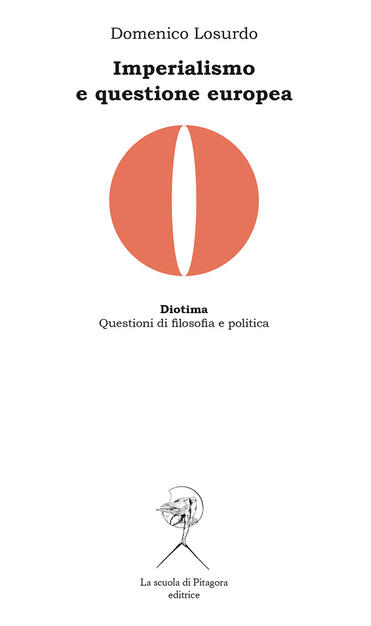Dear Professor Losurdo,
First of all, I am writing under a certain reservation, because the fact is that I could not watch video 2, only videos 1 and 3, plus the two initial minutes of video 2. Still, I don’t frankly think that affects decisively what I have to say concerning this subject. Also, the comment I have written exceeds 4 thousand characters, so I have to split in two parts.
Pareto’s story is, of course, a very long one, and, to put it as shortly as possible, in my opinion you have “touched the wound” when in the last minutes you have mentioned what you called the dogmatic position. Indeed, and although Pareto himself and all his modern fans accepted that his scheme could be applied to Pareto-the-man, they never really accepted to extend it to Pareto-the-“scientist”, who seems to remain flying “apart and above” his own world-vision…
As a matter of fact, to have an attitude of mefiance vis-à-vis the arguments presented in a discussion, any discussion, and suspect that behind the arguments officially presented by intervenient parties there may be deeper motives, a part of which may remain unconscious to participants themselves… where is there any real novelty in that assumption? Not going too far, it will certainly be enough to remember Pareto’s contemporaries Nietzsche and Freud, some time before him French Revolution’s “Idéologues”, and before them XVIIth/XVIIIth centuries “Moralistes”… But, more important, even when that was not proclaimed, that attitude of systematic suspicion has indeed been adopted by lots and lots of people… so, where is really the big deal here?
Of course, any one who proceeds rationally is supposed to assume that any “ratio ratiotinata”, any reasoned reason is by definition fallible, and is supposed to be submitted to the permanent critic of “ratio ratiotinans”, or reasoning reason, which is itself dialectical and transcendent by definition, and capable of making the world, of reproducing and/or transforming it, inasmuch is captures it… the more so since it is also eminently interpellative à la Brecht: “he who sees what we have come to, what is there still that retains him?” Yes, that’s precisely the point; of course!
So, are we to despair from rationalist world-visions? I don’t really think so, although “reason” itself must extend itself endlessly in order to express the endless transformation of the world. If one assumes an eminently “performative” element in this story, if the “verum” is here indeed the “factum”, the more motives, in that case, to remain within a rationalistic (in the broadest sense possible) scheme of thought and of action.... Well, I repeat this is indeed a long story, but I ask you to accept this as my small contribution to the discussion in more “philosophizing” terms.
Oh and two more things. First, Pareto’s scheme of the so-called “ordinal utility” or “economic optimality” – which, by the way, is how he became first academically recognized: as an economist, not so much as an alleged “sociologist” - has implicit to it a deep logic of exigency of unanimity, or “liberum veto”, which is indeed the quintessence of “aristocratic rebel” or frondeuse procedure: confront, please, with Nietzsche and his “Polish” mythical genealogy in Ecce Homo. This group of arguments, one should notice, is strongly present in nowadays “economic theory of democracy”, along the lines of the so called “public choice theory” (and particularly in Kenneth Arrow’s “theorem of impossibility”). So, Pareto’s consciously anti-democratic leaning, his basic way of seeing things, nowadays has become official theory of the soi disant “democracy” – and that fact alone is, of course, immensely eloquent. Maybe, I dare suggest, Pareto’s “eccedenza teorica” is expressed to our days especially as to that aspect…
Second, Pareto’s notions of perpetual recurrence of the same are proved wrong both in which concerns patterns of distribution of wealth (the celebrated 80-20 rule, for instance, being really nothing more than a fancy fétiche for some) and in which concerns levels of per capita income and correspondent demographic patterns - with populations having today unquestionably much longer life expectancies at birth and much smaller average infant mortalities than one century ago, to mention just the more important aspects. For all of its limitations, I do think it will be interesting for you to watch to this video infra, by Hans Rosling. It’s the trend, says Rosling, not the cycle (corsi I ricorsi). I agree: http://www.youtube.com/watch?v=grcvgg4wWQs
Rosling may be wrong in certain aspects: international trade is very far from being unequivocally good in terms of economic growth, for instance; and economic “aid” has mostly come associated with lots of political strings, definitely too many political strings (Western aid I mean, although significantly not Chinese aid…). But I think he tells us things much more close to the deep truth about the “big facts” of the two last centuries than the cynical, embittered speculations of snobbish count Vilfredo Pareto…
Saudações cordiais, Lisboa, 3 de março de 2011, João Carlos Graça














Nessun commento:
Posta un commento